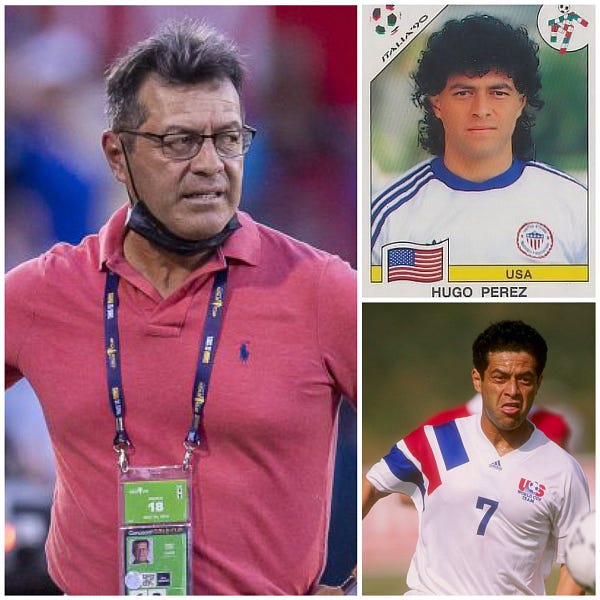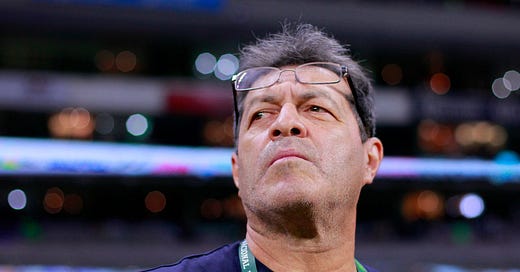🇸🇻 Hugo Perez wants to push El Salvador one step further
The former USMNT player, who faces his old team tonight, still has unfinished business with La Selecta.
Getting CONCACAFed is a newsletter sharing stories and analysis from the Concacaf region.
I write and report on stories others overlook, whether they be happening in Bonaire, El Salvador or somewhere in between.
Hugo Perez is not a novice. He isn’t naive. He knows this is going to end one of two ways: With a triumphal exit to a new opportunity or with getting the axe, and he knows triumphal exits don’t happen too often in Central American soccer.
But even after a Gold Cup run that fell a goal short of being El Salvador’s best-ever, after returning to the final round of World Cup qualification for the first time since the 2010 cycle, Perez is still here. The close of the final round, which saw La Selecta finish in the penultimate place in the table with two wins, four draws and eight defeats, might’ve been time to step away.
After all, things aren’t getting any easier in Salvadoran soccer. Perez and his son Gerson, who is running the U-20s in addition to his role as an assistant coach with the senior team, are bringing through new prospects. The federation is supporting that goal with more resources for dedicated scouts and discovery camps in the U.S., Still, the federation is in constant dispute with the government sports body, players are fed up with the federation and fans continually demand more.
Results like the 2-2 draw with Grenada last week don’t help take the heat off Perez, and tonight’s match against reigning Concacaf Nations League champion United States won’t be easy.
Yet, he’s is still there, hoping not just to be remembered for a good stretch of a year plus leading the national team but to leave a legacy.
“I know how our people think and what the environment is, and how clubs work here, or how the national team had been working for years here,” Hugo Perez told me in a Zoom call just before the Nations League kicked off. “We knew that we were going to face challenges.
“But I’ll tell you the truth. We’re still here for two reasons, and one is to try and see if we can change something.”
Not in the federation or in the government, Perez said. That’s above his pay grade. He wants to change something within the players.
Perez wants to convince the Salvadoran player they can do more than what they’re currently doing if they are able to train better, sacrifice more and compete against higher-level competition more often.
That process needs to start as early as possible, which is where Gerson and the recruiting team come in. Eight of the 20 players on El Salvador’s roster for the upcoming Concacaf U-20 championship are based abroad, seven of them in the U.S.
“After playing Gold Cup, after playing 14 games in qualifiers, you get a sense of the talent that’s there, get a sense of younger players coming up and how they measure up,” Gerson Perez said. “You can start to see even what it might look like in a couple years.
“I think still structurally in El Salvador in terms of formation, methodologies, we’re a little behind on that. So, recruitment comes into play. We’re relying heavily on MLS clubs doing their job scouting, developing players. And I can kind of pick from clubs that play something similar to what I’m looking for.”
With El Salvador also playing a heavy load of friendly matches on non-FIFA dates, some of those U-20 players already have debuted with the senior side. Players like Jeremy Garay of D.C. United and Robinson Aguirre of the Colorado Rapids have earned senior national team minutes before making their MLS debut.
It’s no surprise the El Salvador national team would end up closely linked to the U.S. Hugo Perez and his son are far from the only Salvadorans who have both personal and professional connections in the U.S. as a result of the North American nation’s status as a political giant as well as a soccer one.
Perez’s story is well-known in American soccer circles, the former U.S. international whose work won respect in the youth levels. He later opened an academy in Northern California but began scouting for the Mexican federation after feeling frozen out by the country he represented.


His chance to lead El Salvador, the country of his birth and where he ended his career with FAS (the club of his father and grandfather), was a long time coming, but these matchups against the Stars and Stripes still have an interesting flavor.
“It's obviously special,” Gerson Perez said. “It's a program that we grew up in. It's a program that I can say we've helped, in terms of systematic changes that were made the last 10 years. But one of the best things for me is to know when you play the U.S. here, the player the motivation is at an all-time high. So that's a game where you don't have to worry about, "‘Oh how are they gonna come out?’”
So many managers in the region decide to sit back and pray for a clean sheet and a good counter to get a win against the U.S. or teams like Mexico or Costa Rica. Not so with Perez, whose swashbuckling style was on full display during the Gold Cup.
The decision to try to win possession, to commit numbers forward and to go toe-to-toe with squads is less a romantic decision from Perez than a strategic one.
“When we look at our players, I don't think we can compete with long balls, I don't think we can compete more direct because of our players’ physicality,” Perez said. “I also think that our players, to a certain level, are very technical.
“We realized that we had to come in and try to change a little bit, and put in what we think can help our players, really trying to change the style. And we're not there yet, to be honest with you,” he continued. “But we've been able to take steps to change that, to see if we could play a little bit faster, more dynamic, ball on the ground, building out of the back. And obviously, we try to always keep a lot of possession going forward.”
On what is expected to be a muddy, waterlogged pitch Tuesday night, that may be more difficult.
But Perez is used to taking on difficult jobs. He wants the challenge, especially when it could mean seeing a country he loves take that next step. Perez knows this business. He might not be the person to lead El Salvador back to the first World Cup since 1982. Maybe it will even be his choice if an MLS team makes an interesting offer or something materializes elsewhere.
When El Salvador makes it back to the World Cup, Hugo Perez hopes the work he and Gerson are putting in now will be part of that story.
“We're gonna try to do our best that when we leave this country, we leave something,” Hugo Perez said. “I don't know exactly what it’s going to be that we leave, but we want to change the mentality of our players, in order for them to get better as the future and the ones that are coming. Now, this program has changed.”






